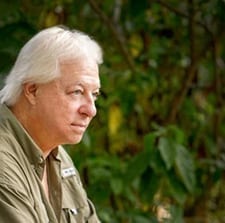The Work Of Hands
November 16, 2023By Tom Poland
Folks say the future belongs to “Knowledge Workers.” A so-called knowledge worker is someone who manages information within a specific subject area. I suppose I’m a knowledge worker. I’m more at home with a keyboard than I am a saw or drill, but I’m not unique. Work, today, for many, comes down to pressing plastic keys.
I never picked up too many handyman skills. And so I envy those who work with their hands. More to the point, I admire people who maintain our cars, repair leaks, and build cabinets. They hold the world together.
Office workers use tools like PowerPoint, Excel, and Microsoft Word. A landscaper can use those tools too and can even design a rock wall on a computer, but sooner or later he has to work with the earth, a level, stones, and saws.

Some 132 million people in the U.S “think” for a living.
The stonemason’s tools are his hands. The beautiful tiered walls, flagstone walkways, and patios he builds are functional art. His natural stones and their hues, lines, and textures please the eye.
I hope we never run out of people who work with their hands. We need talented hands—carpenters, plumbers, and electricians. We need people who don’t mind rolling up their sleeves and getting dirty. And yet we convince too many young people that earning a living means going to college. Off they go studying philosophy and art appreciation only to find themselves helpless when their sink clogs.
Imagine a world without basket weavers, potters, wrought iron gate makers, artists, photographers, and people who build fine musical instruments. People who make collectible brooms, decoys, and fused glass art. People who find joy and beauty in the work of hands, though it can be mighty hard work. Their day often runs from dawn to dusk.
For some artisans, the tradition was passed down to them. Life bequeathed them a calling. Not all prosper, but one true joy in life is loving what you do. If you love your work, it’s not work.
As a boy I used to cross the Augusta Highway and go up to the grove of oaks shading Cap Dunn’s small blacksmith shop. Every day he’d be there hammering molten ingots of iron, cherry-red sparks flying. As rivulets of sweat streamed down his dark face, I could tell he enjoyed the work. Yes, it was smoky, grimy work, and he didn’t make a ton of money, but the man who loves his work is rich in other ways.
Five years ago I spent two afternoons with the Caines Boys over Georgetown way talking about the path that led them to their grandfather’s calling, duck decoy carving. Before carving, Jerry and Roy Caines worked the coastline as shrimpers. “We were married to the sea,” said Jerry. They started carving in 2005. “We both work on decoys,” said Roy. “I do the rough cut and Jerry does the art.” It took six months to make their first decoy. Tupelo gum is the preferred wood although Jerry said they’ve carved some from cedar. Roy passed I heard and that saddened me. I sure hope Jerry is soldiering on.
I envy artisans, craftsmen, and tradesmen. They do real work. I wish I could build furniture, repair things, and keep things shipshape. I’m just not cut out for it, but thank goodness others are.
So here’s something to think about. What if your son or daughter announces that going to college and sitting at a desk is not an option, that they’d rather make fine furniture or landscape yards? All I can say is this: There’s much satisfaction in designing, building, and finishing something. It can be a beautiful desk or yard or fence, most anything.
I like to think that at day’s end, artisans, tradesmen, and craftsmen feel better about their work than the business analyst who runs figures and sees a new BMW is within reach.
You see, craftsmen leave us beauty and functional art, a legacy. And the legions tapping computers? Well, they leave work, usually around 5 o’clock.
Georgia native Tom Poland writes a weekly column about the South, its people, traditions, lifestyle, and culture and speaks frequently to groups in the South. Governor Henry McMaster conferred the Order of the Palmetto upon Tom, South Carolina’s highest civilian honor, stating, “His work is exceptional to the state.” Poland’s work appears in books, magazines, journals, and newspapers throughout the South.
Visit Tom’s website at www.tompoland.net
Email him at [email protected]














